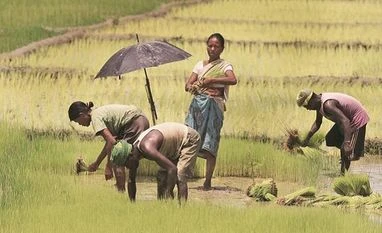Four big states heading for legislative assembly elections in a few months have all announced a slew of measures to woo the farming community.
Crop loan waivers, bonuses on procurement and direct fund transfers for dryland agriculture are among the measures announced by Bharatiya Janata Party-ruled Madhya Pradesh, Rajasthan and Chhattisgarh, and in Congress-ruled Karnataka, over recent weeks.
Critics say many of the measures are half-hearted and meant to garner votes, not addressing the real issue. The experience also shows that actual implementation is often an unsatisfactory story.
Loan waivers, for instance. The conditions attached ensures many growers don’t get the benefit. In Rajasthan, the Vasundhara Raje government in her last full Budget of this tenure announced a loan waiver of up to Rs 50,000 for small and marginal farmers. The allocation for this is Rs 80 billion and aimed to benefit around two million such cultivators with dues up to this amount as on end-September of 2017.
The waiver is only for loans taken from the state’s cooperative institutions. However, data given to Parliament show that in 2016-17, of the total farm credit disbursal of Rs 743 bn in Rajasthan, less than a fifth was from cooperative societies and regional rural banks. Close to two-third of farm loans were from commercial banks. These don’t qualify for the waiver.
“Given the past experience, such announcements haven’t had a big impact on farmers. Also, we feel loan waivers are a tool of deception, as it comes with artificial and sometimes arbitrary categorisation,” says Avik Saha, co-convenor of Jai Kisan Andolan, a conglomeration of scores of farmer organisations across India.
In neighbouring Madhya Pradesh, the administration of Shivraj Singh Chouhan faced a strong farmers’ agitation last year. It had led to the killing of six farmers in police firing in Mandsaur district. The state government announced a slew of measures last week.
The biggest among these was to bring back the system of payment of bonus over the Centre-fixed Minimum Support Price (MSP). The government says the move will cost Rs 16 bn and benefit around a million paddy and wheat farmers.
BJP-ruled Madhya Pradesh had been regularly announcing a bonus over the MSP till the 2014-15 season. It stopped from 2015-16, after the central government in an order issued in June 2014 decided to stop surplus procurement from any Decentralised Procurement State (DCP) that declared a bonus over the MSP. For non-DCP states, it totally stopped purchasing.
The argument given then was that bonus over the MSP distorted the market. DCP states are those which procure, store and distribute grain themselves for the central pool, while the Centre pays for it. The surplus, if any, is given to the Food Corporation of India; any deficit is met by the Corporation.
MP, being a DCP state, was impacted. Between 2015-16 and 2016-17 (after the bonus was stopped), wheat procurement in the state dropped 45 per cent. And, critics alleged wheat grown in neighbouring states was being sold in MP markets for a higher price.
In 2012-13, MP had procured a record 8.5 million tonnes (mt) of wheat, almost surpassing Haryana as India’s second biggest contributor of the grain to the central pool. Much of this, critics said, was due to massive movement of wheat from neighbouring states into MP.
The fear is that unless there is a corresponding rise in wheat prices in neighbouring states, a similar situation might prevail this time as well. The Centre has not also withdrawn the June 2014 order. So, it remains to be seen how the bonus announcement is implemented.
MP says its target is to procure around 6.7 mt of wheat in the 2018-19 rabi marketing season. “We have got assurances from the highest authorities to go ahead with bonus announcements to protect farmers,” a senior official said.
In neighbouring Chhattisgarh, too, the Raman Singh government has announced a bonus of Rs 300 a quintal for paddy (the biggest grain grown in the state) for the 2016-17 and 2017-18 procurement seasons, retrospectively for the earlier.
It says it also plans to build 200 farmers’ markets by end-March, improve its paddy procurement by opening new centres, give loans on zero interest and other measures.
In Karnataka, the Congress government of Siddaramaiah had in the last Budget announced a scheme to give Rs 5,000 per hectare to each of the seven million dryland farmers through direct bank transfer. Called ‘Raitha Belaku’, the grant will be capped at Rs 10,000 per person.
“Many of these are short-term measures and sometimes end up distorting the market, like Madhya Pradesh’s bonus programme. Farm loan waivers are a good solution but how many times can you waive loans?” asks Siraj Hussain, a former agriculture secretary.
Nonetheless, as Saha of Jai Kisan Andolan puts it, the thing about all these announcements is that political parties across the spectrum are giving electoral priority to agriculture issues, which is what it should be.
Unlock 30+ premium stories daily hand-picked by our editors, across devices on browser and app.
Pick your 5 favourite companies, get a daily email with all news updates on them.
Full access to our intuitive epaper - clip, save, share articles from any device; newspaper archives from 2006.
Preferential invites to Business Standard events.
Curated newsletters on markets, personal finance, policy & politics, start-ups, technology, and more.
)